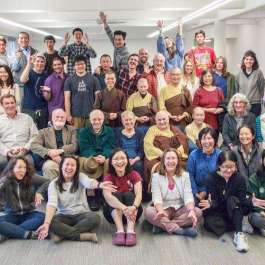
Welcome, dear readers, to a brand-new year of taking metta off the meditation cushion and out into the world.
Last month found me stepping off of “Metta’s Scaffolding” at the meditation center where I am still a live-in volunteer, while this month found me feeling grateful for all that it had taught me and working to keep the brewing breakup classy.
But life is not like the movies, where characters seamlessly walk off into the sunset after a make-or-break decision. Sometimes there are delays or others to consider, or perhaps more lessons to be learned and taught.
Regular readers may remember me reaching my limit with the toxic environment of a woodland management project followed by a month-long delay between the Dharma closing that door and opening a window and “Metta’s Long Corridor” in between. On the day that I finally moved on, one of the lumberjacks unexpectedly paid me the ultimate compliment in the face of the sick mind games played by our hostess with the vulnerable souls in her care: “Absolute respect for keeping classy as f*ck, no matter what she tried.”
From then on, #classyaf became my personal hashtag for keeping equanimous in the face of the storms of other people and not being able to move on as soon as I would like.

Back at the meditation center, I was still due to sit a three-day course and had promised to serve over the holidays. The sit turned into an unexpected free fall, and the serve into an unexpected pitfall.
For any readers who have never sat a 10-day Vipassana course, the first three days introduce anapanasati (Pali: observing your breath Skt: anapanasmrti), the next six days vipassana (observing your bodily sensations), and then metta (Skt: maitri) on the final day before breaking noble silence. That same ratio can be stretched out for longer: 20-, 30-, 45-, or even 60-day courses, and condensed for shorter courses such as the three-day I was due to sit, just as I was sensing that it might be time for me to walk away.
I sat with this conflict, and felt the pull to turn up regardless—if for no other reason than to say thank you. Thank you for the good, the bad, and the ugly I had experienced sitting and serving over the last 15 years.
It was an even more fun and comforting surprise to see how quickly the group settled into the journey. After supporting five months of new students splashing about in the shallow end of sitting their first course, there was the same palpable hush in the hall as watching Olympic divers approach the 10-metre platform and committing to a headfirst dive into the deep end.
Within the first hour, I was surprised to find myself already in as deep as I would be halfway through a 10-day course. Gratitude flooded me for simple things such as my breath, and more complex things such as the current center’s politics which were allowing me to surface parts of me still in need of metta and fresh understanding.
As I sat silently facing the same Dhamma seat that had been the scene of my decision to walk away two weeks earlier and many of the long-term servers whose behaviors had played a part in that decision, a new level of equanimity came up for air.

It was just a piece of carpet, and my real Dharma seat and center were within and with me for the long-term wherever I went. And while I respect the hours that any meditator has spent on their mat, particularly assistant teachers, they were not my authority. After months, even years now if I count all the volunteering I’ve done on organic farms, of bailing water for sinking ships because of games of responsibility hot potato, a deeper knowing emerged understanding that all that ultimately mattered was between me and the mat.
After a time, I felt S. N. Goenka and his beautiful wife Mataji—who silently generated metta in the background of nightly discourse videos, while her husband taught aloud—give me their blessing to be happy come what may. Her humble holding of the space surrounding Goenka with metta and quiet “show, don’t tell” example had always resonated more with me than his formal teachings.

“She sits with me always giving metta, hence you all are able to sit comfortably in the courses,” he would say. “Otherwise, perhaps many of you would have run away.” Goenkaji has said this has been Mataji’s major contribution. “I too am tremendously supported in my endeavors by her powerful metta.” (Vipassana Research Institute)
I had arrived at the center in August with the best of intentions to help it find its feet, and stayed on longer than I had intended when I noticed that it could do with more metta Mataji-style. Was this still the case? And, if so, how best to navigate the center’s politics once it came time to break noble silence?
A new personal hashtag emerged alongside the new level of equanimity, thanks to podcaster and author Mel Robbins. Robbins calls it the “let them” theory, a mindset tool to stop wasting energy on trying to get other people to meet your expectations. Just let them show you who they truly are, and then you get to choose what you do next.
My team had already shown me who they truly were, but the site teacher had yet to address the concerns I had raised. I waited and waited, let them and let them, holding a space with metta for the highest good of all concerned.

Over Christmas and the New Year, the center was in the enviable position of having a full house of course servers. The long-term server accommodation that I had been helping to build was nearly complete, so I offered to prepare the grounds for spring with pruning, weeding, and raking up dead leaves.
It proved to be the perfect way to stay #classyaf and just #letthem while the site’s compost area grew into a beaver dam of deadwood and debris. As I came up for air from the free fall of the three-day course, so did sweet new possibilities for the coming year. I discovered primroses already crowning under December’s dead leaves, as well as my own tender heart after the heartbreak described in “Vanishing Metta.”
The first sign of the unexpected pitfall to come emerged while raking up December’s dead leaves, when, just before New Year’s Eve, I was asked to call the site teacher later that afternoon. My hopes that they were finally taking my concerns for the center seriously were dashed when they spent nearly an hour-and-a-half unexpectedly dissecting last month’s article and barely letting me get a word in edgeways.
The days that followed found me back in the splash and splutter of the center’s shallow end, debating whether to keep my article up or take it down—rather fitting given that it was about scaffolding of all sorts. Champions appeared from unexpected corners and critics from others. Someone wisely pointed out that no one would be taking such issue with what I had written if it did not contain some element of truth. When it became clear most at the center had read it, I admit that it felt unexpectedly peaceful to be given the silent treatment by teammates so at war with themselves.
Interestingly, a regular visitor to the center, unaware of the article, recently commented to me without malice that they questioned the site teacher’s own meditation practice given the sad state of the place. The following day, that same teacher called again during my day off to invite me to consider that I was mistaken in my meditation practice by spending too much time generating metta rather than purifying myself with vipassana.

I felt the spirit of Mataji gently place a #letthem hand on my shoulder, witnessing the crossfire of the war within them, and simply blessed the mess of this ongoing game of responsibility hot potato.
And so, dear readers, as we all dive head first into 2025, let us thank the inner and outer scaffolding that has brought us this far, rake up last year’s dead leaves, drop any responsibility hot potatoes that aren’t ours to carry, hold a space for metta, stay #classyaf, and just #letthem.
Only then do we get to choose what we do next.
Or, to metta-morphose Ariana Grande’s song “thank u, next” about feeling grateful for everyone and everything that came before:
I’ve got so much love (love)
Got so much patience (patience)
I’ve learned from the pain (pain)
I turned out amazing (turned out amazing)
I’ve loved and I’ve lost (yeah, yeah)
But that’s not what I see (yeah, yeah)
‘Cause look what I’ve found (yeah, yeah)
Ain’t no need for searching
And for that, I’ll sayThank you, next (thank you, next)
Thank you, next (thank you, next)
Thank you, next
I’m so grateful for my metta
See more
Dhamma Messenger of Compassion and Peace – Mataji Illaichidevi Goenka (Vipassana Research Institute)
Dhamma Rasmi, Vipassana Meditation Centre Queensland (Facebook)
The Let Them Theory by Mel Robbins (Youtube)
Mel Robbins Wants You to Lose Control (New York Times)
Related features from BDG
From Traditional Roots to Modern Mindfulness: The Movement of Vipassana Meditation in the 20th Century
Lessons Beyond the Meditation Hall
Vipassana Meditation and Mindfulness
Dipa Ma: The Daughters of the Buddha Are Fearless
Dipa Ma – An extraordinary female Buddhist master in the twentieth century
Commemorating the Centenary of the Birth of Vipassana Meditation Master Munindraji
















